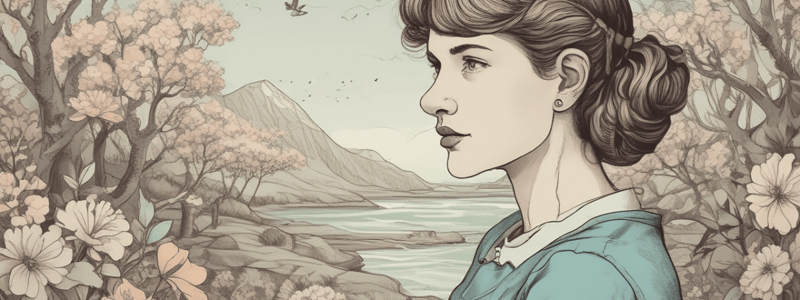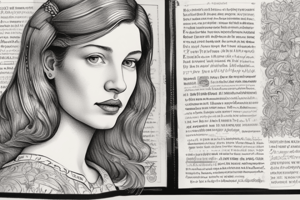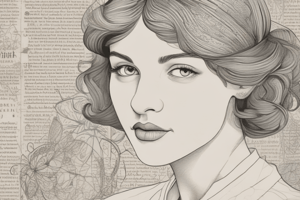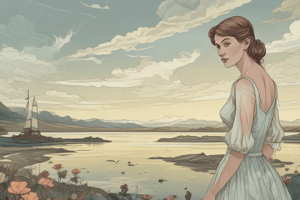Podcast
Questions and Answers
What does the enjambment linking the second and third stanza portray?
What does the enjambment linking the second and third stanza portray?
- The child's imperfections
- The mother's anxiety about the child's future
- The child's flawless growth (correct)
- The mother's overwhelming joy
What does Plath want to fill her son's eyes with?
What does Plath want to fill her son's eyes with?
- Wonderful and classical things (correct)
- Her own anxiety and fears
- Her own depression and pain
- The troubles of the world
What is the contrast between the child and Plath's pain?
What is the contrast between the child and Plath's pain?
- Peaceful
- Harrowing (correct)
- Harmonious
- Serene
What is the significance of the 'Ceiling without a star'?
What is the significance of the 'Ceiling without a star'?
What does the poem ultimately suggest about Plath's life?
What does the poem ultimately suggest about Plath's life?
What is a significant aspect of the title of the poem 'Child'?
What is a significant aspect of the title of the poem 'Child'?
What is the effect of the juxtaposition of the flowers and the poet's attraction to death?
What is the effect of the juxtaposition of the flowers and the poet's attraction to death?
Flashcards
Enjambment's effect (2nd & 3rd stanza)
Enjambment's effect (2nd & 3rd stanza)
The enjambment linking the second and third stanzas represents the child's seamless growth.
Plath's desire for son
Plath's desire for son
Plath wants to fill her son's eyes with wonderful and classical things.
Child vs. Plath's turmoil
Child vs. Plath's turmoil
The poem contrasts the child's flawless growth with Plath's deep pain, creating a stark and harrowing image.
Starless Ceiling's meaning
Starless Ceiling's meaning
Signup and view all the flashcards
Poem's implication about Plath
Poem's implication about Plath
Signup and view all the flashcards
Title 'Child's' reflection
Title 'Child's' reflection
Signup and view all the flashcards
Flowers and death's juxtaposition
Flowers and death's juxtaposition
Signup and view all the flashcards
Study Notes
Overview of the Poem "Child"
- The poem "Child" is one of Sylvia Plath's most powerful works, written just before her suicide in 1963.
- The poem is addressed to her son Nicholas, and it takes a dark and depressing turn towards the end.
Themes and Ideas
- The innocence of children
- The beauty of her son
- Love
- Motherhood
- Depression
- Suicidal thoughts
Style
- Imagery from the natural world
- Personal tone: directly speaking to Nicholas
- Rhyme
- Enjambment
- Figurative language, including a powerful metaphor at the end
Analysis of Key Quotes
-
"Your clear eye is the one absolutely beautiful thing. I want to fill it with color and ducks, / the zoo of the new."
- Plath speaks directly to Nicholas, expressing her love and desire to fill his vision with joyful things.
- The use of words like "color" and "ducks" creates a sense of childhood and innocence.
- The internal rhyme in "zoo of the new" adds to the euphony of the poem.
-
"Whose names you meditate – / April snowdrop, Indian pipe, / Little / Stalk without wrinkle, / Pool in which images / Should be grand and classical"
- Nicholas is imagined reciting the names of plants and flowers he learns, which sound appealing due to their 'p' sounds.
- The seemingly innocent flowers are juxtaposed with Plath's attraction to death.
- The enjambment linking the second and third stanzas portrays Nicholas as a flawless and growing stalk.
- Plath thinks that her son's eyes should be like a pool, reflecting only grand and classical things.
-
"Not this troublous / Wringing of hands, this dark / Ceiling without a star."
- Plath is suddenly brought back to her own reality, filled with depression and pain.
- The juxtaposition of the joy of the child and Plath's own pain and anguish is harrowing for the reader.
- The poem ultimately reveals that even the "one absolutely beautiful" sight in the world could not have saved Plath from her depression.
Studying That Suits You
Use AI to generate personalized quizzes and flashcards to suit your learning preferences.




